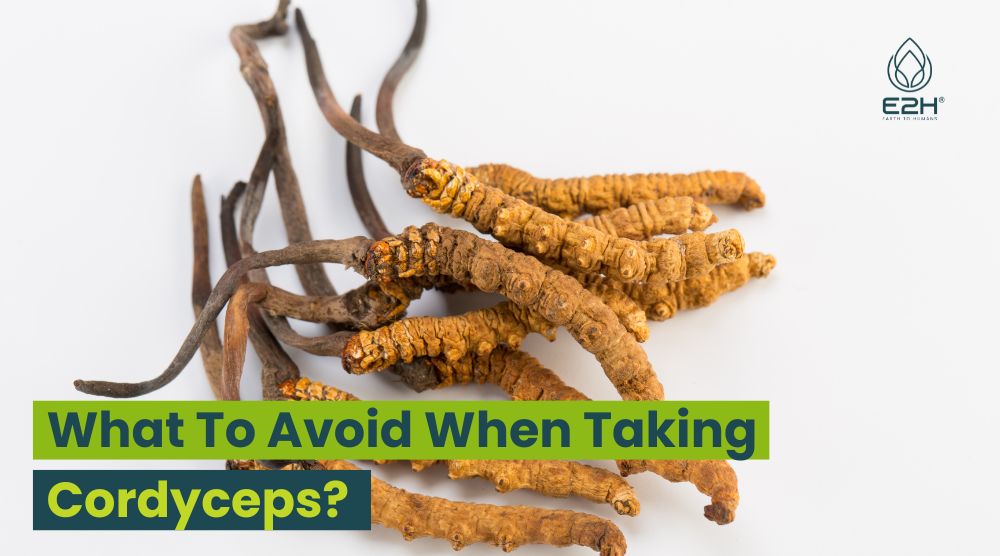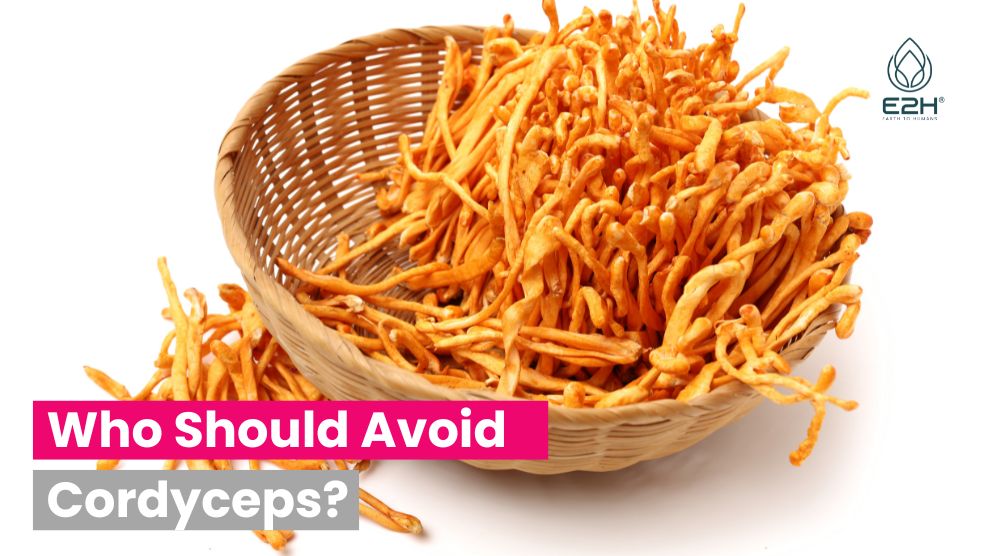Cordyceps is reputed for potentially enhancing respiratory and cardiovascular health by improving oxygen utilization, exhibiting anti-inflammatory properties, and supporting heart function.
With a rich history in ancient healing practices and a growing body of contemporary research, Cordyceps invites you on a journey to explore its potential in supporting your vital systems. Join us as we explore the science, the stories, and the practicalities of integrating Cordyceps into your wellness routine.
How Does Cordyceps Support Respiratory And Cardio Health benefits?
Cordyceps is renowned for its potential to support both respiratory and cardiovascular health through various mechanisms, as per traditional beliefs and some scientific studies:
Respiratory Health:
- Enhanced Oxygen Utilization: Cordyceps is believed to enhance the efficiency of the respiratory chain, potentially improving the way our bodies utilize oxygen, which can be particularly beneficial for maintaining lung health.
- Anti-Inflammatory Properties: It may exhibit anti-inflammatory properties that can potentially benefit respiratory health by mitigating inflammation in the airways.
- Immune Support: Cordyceps might assist in modulating immune responses, which can indirectly support respiratory health by managing immune-related conditions affecting the lungs.

Cardiovascular Health:
- Supporting Heart Muscle: Some studies suggest that Cordyceps can positively impact heart health by potentially supporting the function of the heart muscle and enhancing its ability to pump effectively.
- Blood Flow: It might help in improving blood flow and circulation, which is crucial for maintaining cardiovascular health.
- Cholesterol Management: Cordyceps may also play a role in managing cholesterol levels, thereby supporting heart health by maintaining arterial health and function.
Are there scientific studies supporting the health benefits of Cordyceps?
Yes, numerous scientific studies explore the health benefits of Cordyceps, particularly its potential impacts on immunity, endurance, and respiratory health. Some research indicates that Cordyceps can enhance cellular energy production and improve stamina by increasing the body’s production of adenosine triphosphate (ATP).
Studies have also explored its potential anti-inflammatory and antioxidant properties, which may support overall health and wellness. Furthermore, research in animal models suggests potential benefits in managing blood sugar levels and supporting heart health.
However, while these are animal research studies provide valuable insights, it is crucial to note that more comprehensive research, particularly in human subjects, is needed to fully understand the scope and magnitude of Cordyceps’ health benefits and to establish standardized guidelines for its use.
What is the recommended dosage of Cordyceps?
The recommended dosage of Cordyceps can vary based on the specific supplement and the purpose for which it is being used. Generally, dosages range from 1,000 to 3,000 milligrams per day for general health purposes.
However, some studies have utilized higher doses for short-term therapeutic use. It’s crucial to follow the dosage guidelines provided on the supplement packaging and consult with a healthcare professional to determine the appropriate dosage for your individual needs, considering factors like age, health status, and any underlying health conditions.
Are there any side effects or risks associated with Cordyceps consumption?
Cordyceps is generally considered safe for most people when taken appropriately. However, some individuals may experience side- effects of cordyceps, such as dry mouth, nausea, and diarrhea. There have been instances where Cordyceps has been associated with lead poisoning, likely due to contaminated sources.
Additionally, because Cordyceps can affect the immune system and blood sugar levels, individuals with auto-immune diseases or diabetes should exercise caution. Pregnant or breastfeeding women and individuals scheduled for surgery should also consult healthcare professionals before using Cordyceps to avoid potential risks or interactions.
Where can I buy Cordyceps?
You can purchase Cordyceps from various outlets, ensuring you select a reputable source to guarantee quality and potency. Some options include:
- E2H (Earth to Human): E2H offers a range of health and wellness products, potentially including Cordyceps, with a focus on natural and sustainable offerings.
- Amazon: A wide variety of Cordyceps supplements, in various forms like powder, capsules, and tinctures, are available from numerous brands on Amazon, providing ample choice to consumers.
- Local Stores: Health food stores, pharmacies, and specialty shops in your locality might stock Cordyceps supplements. Shopping locally also allows you to seek advice from shopkeepers who might be familiar with the products.
How do I choose a high-quality Cordyceps product?
Choosing a high-quality Cordyceps product involves considering several factors to ensure its efficacy and safety. Firstly, opt for brands that are transparent about their sourcing and production methods. The product should ideally be tested for quality and purity by third-party laboratories.
Check for certifications from regulatory bodies, which can be an indicator of quality and safety. Review the product label for the scientific name, Cordyceps sinensis, and be wary of products that lack detailed information. Additionally, read customer reviews and possibly seek recommendations from healthcare professionals to ensure you select a product that is trusted and has proven efficacy.
How do athletes and fitness enthusiasts use Cordyceps for health improvement?
Athletes and fitness enthusiasts often utilize Cordyceps to enhance their exercise performance and recovery due to its purported benefits in enhancing aerobic capacity, improving oxygen utilization and increasing stamina.
Cordyceps is believed to support the body’s production of adenosine triphosphate (ATP), which is vital for delivering energy to the muscles. This, in turn, may help to improve endurance and reduce fatigue.
Some athletes incorporate Cordyceps into their pre-workout supplements for an energy boost, while others may use it post-workout to aid recovery. It’s also utilized to support respiratory health, which is crucial for maintaining optimal athletic performance. Always consult with a healthcare professional or a sports nutritionist to determine the appropriate usage for individual needs.
Are there alternatives to Cordyceps that also support respiratory and cardio health?
Yes, there are several alternatives to Cordyceps that are also recognized for supporting respiratory and cardiovascular health. Some of these include:
- Omega-3 Fatty Acids: Known to support heart health by improving cholesterol levels and reducing inflammation.
- Coenzyme Q10 (CoQ10): Often used to support heart health and improve cellular energy production.
- Garlic: Recognized for its potential to lower cholesterol levels and support heart health.
- Hawthorn: Traditionally used to treat heart failure and improve cardiovascular function.
- Astragalus: Used in traditional medicine to support immune function and heart health.
- Ginseng: Believed to have properties that support lung function and enhance stamina. Always ensure to consult with a healthcare provider before incorporating any alternative supplements to validate their efficacy and safety for your individual health context.
How can Cordyceps be incorporated into daily meals or recipes?
Cordyceps, available in various forms like powders, tinctures, and capsules, can be seamlessly incorporated into daily meals and recipes to harness its potential benefits. Cordyceps powder can be added to smoothies, soups, or teas, providing a nutrient boost without altering the flavor significantly.

It can also be sprinkled over salads or incorporated into salad dressings. For a morning kickstart, consider adding Cordyceps powder to your coffee or a breakfast smoothie. In culinary practices, especially in Asian cuisines, Cordyceps is sometimes used in simmered dishes, allowing the nutrients to infuse into broths, enhancing both the nutrient profile and flavor of the meal.
How is Cordyceps used in traditional Chinese medicine?
In traditional Chinese medicine (TCM), Cordyceps is revered for its ability to enhance vitality and support lung and kidney health. It is believed to nourish the “Yin” and “Yang,” representing the dual balancing forces in the body. Cordyceps is often utilized to address fatigue, boost stamina, and improve respiratory function by allegedly enhancing the utilization of oxygen in the body.
It is also used to support sexual function benefit heart health and is incorporated into treatments for various ailments, including chronic coughs and weakness. TCM practitioners often use Cordyceps in soups and brews, sometimes combining it with other medicinal herbs to enhance its efficacy in promoting wellness and balance.
Where is Cordyceps Sinensis naturally found?
Cordyceps Sinensis is naturally found in the high-altitude regions of the Tibetan Plateau, including parts of China, Bhutan, Nepal, and India. It thrives in the alpine grassland areas, parasitizing the larvae of ghost moths and deriving nutrients from them.
The fungus grows at elevations above 3,800 meters, in cold, grassy, alpine environments. The harsh and specific growing conditions contribute to the rarity and high cost of wild effects of Cordyceps sinensis. Due to its scarcity and the increasing demand, cultivation methods have been developed to produce Cordyceps, but wild Cordyceps Sinensis is still highly prized for its purported superior quality and potency.
How do Cordyceps supplements compare to natural Cordyceps?
Cordyceps supplements, often available in forms like powders, capsules, and tinctures, are typically developed to provide a concentrated source of the active compounds found in natural, Cordyceps species. While they offer a convenient and accessible way to harness the potential benefits of Cordyceps, the efficacy can depend on factors like the quality of the supplement, the extraction process, and the concentration of active ingredients.

Natural Cordyceps, particularly the wild variety, is often considered to be more potent and is highly prized in traditional herbal medicine. However, due to its scarcity and high cost, cultivated Cordyceps and supplements are more commonly used. It’s vital to choose high-quality supplements from reputable sources to ensure safety and efficacy, and to consult healthcare professionals for appropriate guidance.
FAQs
What are the active compounds in Cordyceps that contribute to health benefits?
Cordycepin and adenosine are key compounds in Cordyceps, believed to offer anti-inflammatory and energy-boosting benefits, respectively.
Can Cordyceps interact with any medications or conditions adversely?
Yes, Cordyceps can interact with blood thinners and immunosuppressive medications, and may affect conditions like auto-immune disorders adversely.
Is Cordyceps suitable for vegetarians and vegans?
Yes, cultivated Cordyceps supplements, especially synthetically grown versions, are generally suitable for vegetarians and vegans.
How long does it take to observe health benefits from taking Cordyceps?
The time to observe benefits can vary, often requiring consistent use over weeks or months, depending on the individual and dosage.
Are there different species of Cordyceps, and do they have different properties?
Yes, there are multiple species of Cordyceps, like Cordyceps sinensis and Cordyceps militaris, each with potentially varying health properties.
Conclusion
Exploring the potential of Cordyceps in supporting respiratory and cardiovascular health unveils a fascinating intersection between traditional wisdom, alternative medicine and modern science. While the journey through its myriad of uses and research findings is enlightening, it’s pivotal to approach its application with a balanced perspective, acknowledging the need for further research and personalized healthcare advice. As we continue to explore the wonders of natural supplements, may the insights from human research on Cordyceps guide us towards mindful choices in nurturing our well-being.














